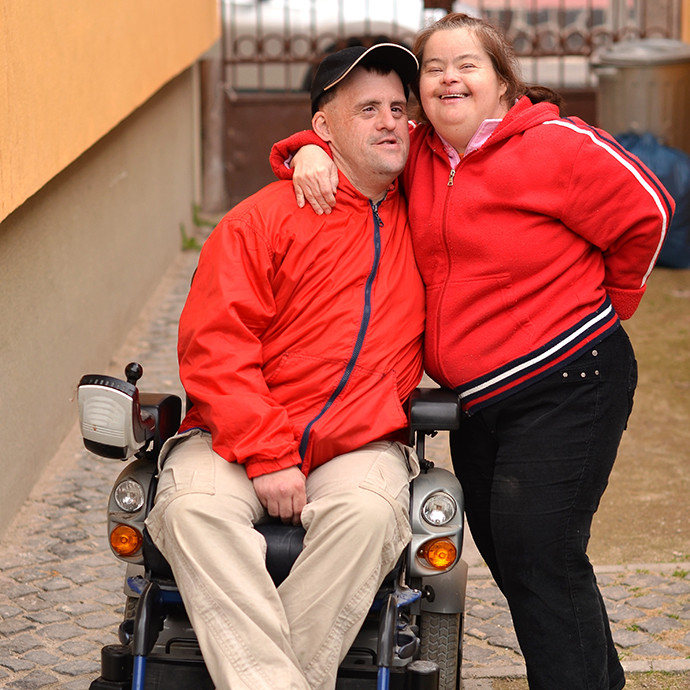AAIDD and The Arc Position Statement on Sexuality
Sexuality
People with intellectual disabilities and/or developmental disabilities, like all people, have inherent sexual rights. These rights and needs must be affirmed, defended, and respected.
Issue
For decades, people with intellectual disabilities and/or developmental disabilities have been thought to be asexual, having no need for loving and fulfilling relationships with others. Individual rights to sexuality, which is essential to human health and well-being, have been denied. This loss has negatively affected people with intellectual disabilities in gender identity, friendships, self-esteem, body image and awareness, emotional growth, and social behavior. People with intellectual or developmental disabilities frequently lack access to appropriate sex education in schools and other settings. At the same time, some individuals may engage in sexual activity as a result of poor options, manipulation, loneliness or physical force rather than as an expression of their sexuality.
Position
Every person has the right to exercise choices regarding sexual expression and social
relationships. The presence of an intellectual or developmental disability, regardless
of severity, does not, in itself, justify loss of rights related to sexuality.
All people have the right within interpersonal relationships to:
- Develop friendships and emotional and sexual relationships where they can love and be loved, and begin and end a relationship as they choose;
- Dignity and respect
- Privacy, confidentiality, and freedom of association.
With respect to sexuality, individuals have a right to:
- Sexual expression and education, reflective of their own cultural, religious and moral values and of social responsibility;
- Individualized education and information to encourage informed decision-making, including education about such issues as reproduction, marriage and family life, abstinence, safe sexual practices, sexual orientation, sexual abuse, and sexually transmitted diseases; and
- Protection from sexual harassment and from physical, sexual, and emotional abuse.
- and a responsibility to consider the values, rights, and feelings of others.
With respect to the potential for having and raising children, individuals with intellectual or developmental disabilities have the right to:
- Education and information about having and raising children that is individualized to reflect each person’s unique ability to understand;
- Make their own decisions related to having and raising children with supports as necessary;
- Make their own decisions related to using birth control methods within the context of their personal or religious beliefs;
- Have control over their own bodies; and
- Be protected from sterilization solely because of their disability.
Adopted:
Board of Directors, The Arc of the United States
August 4, 2008
Board of Directors, AAIDD
August 18, 2008
Congress of Delegates, The Arc of the United States
November 8, 2008
Become a Facilitator
Do you support people with developmental disabilities?
Do you want to provide a class help those you serve build healthy relationships?
The Wyoming Institute for Disabilities (WIND) is training professionals and providers to become facilitators of the Friendships & Dating Program.

Facilitators for Friendships & Dating Program
The Friendships and Dating Program (FDP) teaches adolescents and adults with intellectual and related developmental disabilities how to make and keep healthy relationships and prevent violence in their relationships.
Facilitators will be trained to deliver the 10-week Friendships & Dating course. Stipend for completing the class may be available.
Want to become a Friendships & Dating Facilitator?
Individuals who are interested in facilitating can contact Amy M. Rieser at srh@uwyo.edu for more information.
Friendships & Dating Course
The program covers:
- Feelings
- Types of relationships
- The dating process
- Personal safety
- Personal boundaries
- Communication
- Meeting people
- Planning social activities
- Sexual health
- Conflict resolution
Friendships & Dating course specifics:
- Sessions held twice a week (20 sessions)
- Each session is 1.5 hours
- The first class each week is held in a classroom setting
- The second class is held at different locations in the community to help reinforce the skills taught in the classroom
- Classes are made up of about 6-10 participants
Facilitating Friendships & Dating
Wyoming Institute for Disabilities (WIND), in collaboration with the University of Alaska Anchorage Center for Human Development, trains staff and providers working in communities across Wyoming to implement the Friendships & Dating Program (FDP).
The training is available at no cost.
Facilitators will:
- Attend a 2-day virtual training to learn how to deliver the program content.
- Assist with recruiting a group of 6-10 coed participants
- Co-facilitate in a team of two to deliver the program within one year of the training date
- Help class participants complete assessments before and after delivering the curriculum
Facilitators will receive:
- The FDP Manual and Training Guide
- All session materials such as handouts, DVDs, posters, and games to implement the program
- Access to the FDP website with support materials such as videos, PowerPoint presentations, etc.
- Assistance with setting up a class and ongoing support throughout the 10-week program from WIND staff
- Valuable facilitation skills and knowledge of healthy relationships
- Additional free access to an online professional development web course for Direct Service Providers on Supporting Healthy Relationships
- Travel funds available for trainees to attend the training
Training for Direct Support Professionals
Supporting Healthy Relationships: A Web Course
Training for members of individuals’ support networks (e.g. guardians, case managers,
disability service providers, parents, family) to learn how to support the sexual
health, safety, self-determination, expression, and rights of people with intellectual
and developmental disabilities is now available.
Meaningful interpersonal relationships are important in the lives of all individuals.
Direct Support Professionals (DSPs) play an important role supporting the individuals
they serve in developing and maintaining healthy relationships.
Modules include:
- Your role as a DSP: The NADSP Code of Ethics
- Introduction to Supporting Healthy Relationships
- Types of Relationships
- Communication
- Human Development
- Sexual Safety
- Abuse Prevention
- Resources
Training is self-paced and accessible from anywhere with an internet connection. Built-in quizzes are included to check your understanding and advance your knowledge.
Certificate awarded upon completion
WIND staff is available for questions, suggestions, or other feedback
To access the new web course, click the button below and navigate to the Wyoming Institute
for Disabilities (WIND) Catalog and then enroll in the Healthy Relationships - Training
for Direct Service Providers.
Please contact Amy M. Rieser, Project Coordinator, with any questions:
Email: srh@uwyo.edu
Phone: (307) 766-2718


